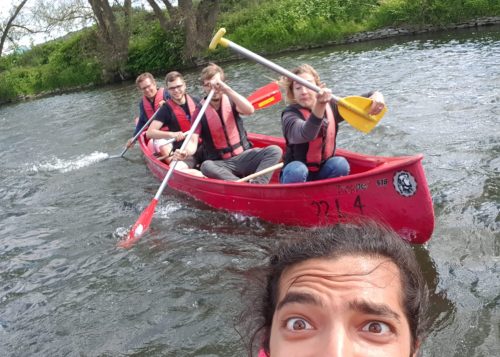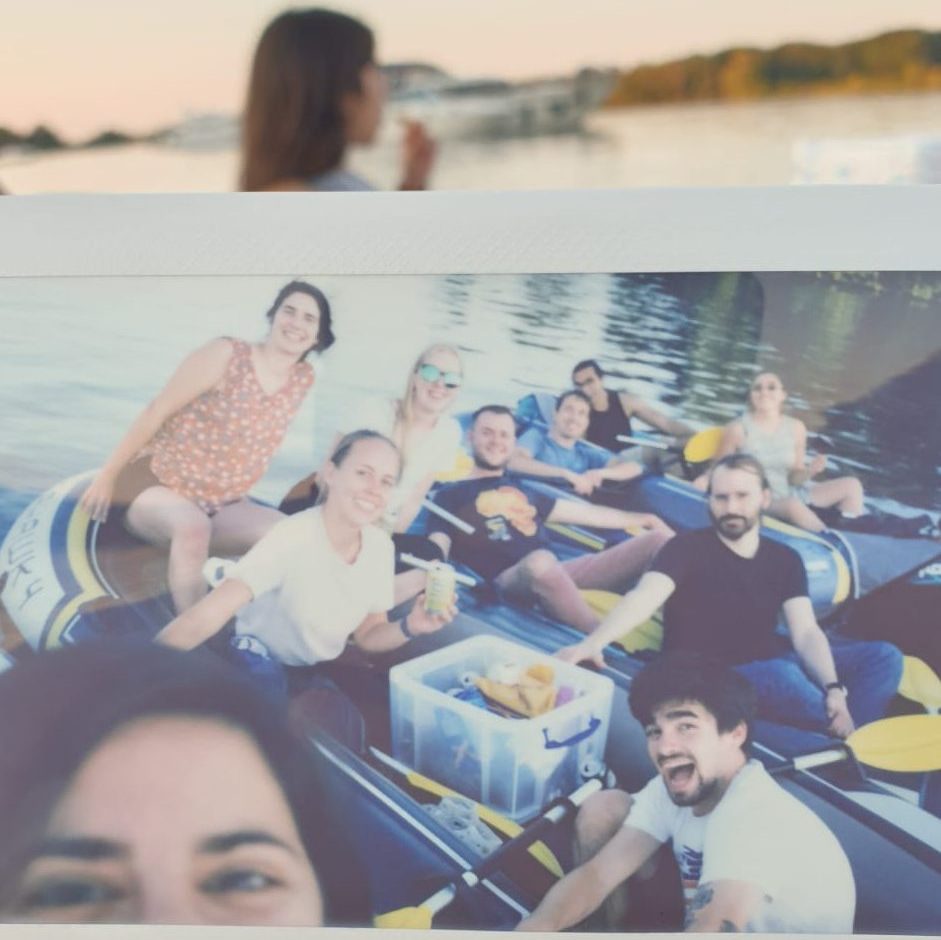Going with the flow
Posted by Dhruv Raina, on 31 January 2022
(or Navigating post-PhD turbulence in the midst of the pandemic)
Working in academic research was such a blast that I’d never imagined anything else for myself. After my Master’s degree in regenerative medicine, I worked at the National Center for Biological Sciences (NCBS) in Bangalore, India, for a few years before I came across a post on The Node advertising a terrific project in Dr. Christian Schröter’s lab at the Max Planck Institute of Molecular Physiology (MPI). I had a fantastic time working on my doctoral projects at Chris’ lab, and the years packed with long debates about robustness and heterogeneity, coupled with many wonderful lab outings (pre-pandemic, of course :’-[ ) simply flew by. Last year, after I handed in my thesis, I saw an ad for Mosa Meat, a start-up working on developing cultured meat and made what appeared to be a sudden decision to change my career trajectory; I decided to join them.

I’ve always been captivated by a common refrain in biology: the tension between the fidelity of information transmission required in a process and the stochastics-driven heterogeneity or noise at that operational scale. As my PhD on signalling and fate choices in mouse embryonic stem cells drew to a close, I had my eye out for other systems where I could continue to study different aspects of this tension between robustness and exploratory behaviour. At the same time, after the tumultuous events of recent years, the call-to-action for addressing the climate crisis and re-thinking modern supply chains had firmly lodged itself in my heart. I was craving an outlet for these energies.
My first exposure to cultured meat came from an unlikely source: my partner’s father. He mentioned cellular agriculture in a conversation we had about changing the way we eat and for weeks after, the idea kept playing over and over again in my mind. When I saw Mosa Meat was hiring, I reached out to Joshua Flack, the scientist who’d placed the ad, in a cautious email peppered with tentative phrasing, to enquire a bit more about the role. Among the puzzles they were trying to solve, one stood out to me clearly – the question of how to robustly guide cells into certain fates and overcome the hydra of heterogeneity. After a set of interviews and a few chats with Josh and the other brilliant scientists at Mosa Meat, I was sold – here was a problem that promised to be both intellectually challenging and morally fulfilling.

(that’s me all the way in the back!)
Mosa Meat, as a food technology start-up, is packed to the gills with engineers and biologists at varying levels of experience, all of whom are simultaneously working at cracking different parts of this complex puzzle: how do we create cleaner and kinder meat? Working as a senior scientist in the Stemness and Isolation team, I’m trying to figure out the cell biology of bovine satellite and fibro-adipogenic progenitor cells in our bioreactors, how to guide them to retain their stemness and, later, to differentiate. What does this mean in practice? My daily life here looks a lot like it looked back in academia but with some differences. The similarities between the two are all the necessary verbiage of science: cell culture, banging your head against the wall trying to design an experiment that feels neat, imaging, flow cytometry, grabbing someone in the hall to have a quick chat about their recent results, and so on. The only practical difference is that instead of the small teams that academic environments foster, everyone here works as one big team that is fully invested in each others’ work. This means that in addition to discussions over Slack and email, plenty of in-person meetings are held to make sure everyone is up-to-date on the most recent findings. It’s a bit of an unusual experience for me (and by no means one that’s unwanted!) to work in a team of over a hundred scientists and engineers who are all excited about your most recent experiment.
Satellite cells finding their way into a myofiber at Mosa Meat. Imaged on a Phasefocus Livecyte microscope
At a higher level of abstraction, there are more differences between my work at the MPI and the work I’m doing here at Mosa Meat. For me personally, the work I did at the MPI was very focused on pushing advances in conceptual frameworks, whereas the focus here is more on leveraging conceptual advances to develop robustness in method. I certainly don’t mean to paint these differences as a dichotomy, and while in any project most of us think along both these tracks simultaneously, at Mosa Meat there is a bit more emphasis on the latter.
When I now reflect on my professional trajectory over the past year, it doesn’t feel like a sudden change of career but more like a natural extension of my personality and interests. In the end, I found that once I had distilled my initial desire to work in academia down to a few core drivers, I no longer thought about my career choices framed as a debate between ‘industry vs. academia’. I realized that what I really wanted to do was work at the bleeding edge of discovery and to strike out in a new and relatively unexplored direction.
Packaged into this career choice was also an inevitable geographic relocation. I won’t say too much about how this factored into my decision, since it’s a subject everyone in science has to contend with, and how one deals with it is specific to the individuals and their circumstances. While moving countries in the middle of the pandemic and wrestling with all the ensuing paperwork was personally a hard decision (especially for us as immigrants), I was fortunate in that my partner (also a scientist) and I were deeply familiar with the infamous two-body problem as it relates to relationships and lab locations, and were well prepared for it.
After five months of working here in beautiful Maastricht with a wonderful team of very smart people who share similar ethics and values around sustainability as me, I still can’t wait to burst into the lab every day. It’s tremendously exciting to work at a start-up that is trying to simultaneously solve not just a difficult biological problem but also a tough engineering and scale-up challenge.
And yes, of course, I’m also driven by the temptation of getting my teeth into a delicious Mosa burger!


 (7 votes)
(7 votes)
Hi Dhruv,
I loved this post! My name is Sreyam, I’m a 3rd year PhD student at IST Austria. My background is in physics, but now I work on theoretical models of cell fate choice. An obvious real-world application is, of course, growing tissues in the lab – exactly what you’re doing at Mosa Meat.
Recently, I’ve become obsessed with cultured meat. I’m from India (like you, I guess) and I’ve grown up seeing people’s physical growth stunted from protein deficiency. I believe cheap cultured meat could be one step in solving this problem.
I have been considering internships in various cultured meat companies, but I’m not sure if there is any demand for theorists. Your story inspired me. I did see the open call for internships at Mosa Meat, but unless I know they could use a modeler, there’s no point in applying. I can’t work in a lab – I tried.
Could you maybe share some inside info on what it’s like to work there? I know these companies hire a lot of cell biologists, food engineers etc… You’ve worked at an MPI so I’m guessing you worked with modelers, so you know such collaborations (sometimes) work. Any tips for someone like me, who’s trying to get into the industry?
Best,
Sreyam.
Just an addendum to my previous comment, and to give you an idea of what kind of work I do: I read your recent Development paper on how inter-cell communication influences the proportioning of cell fates in the mouse embryo. To be honest, I found the theoretical companion paper (Stanoev et al) easier to read, and I myself work on similar questions, using similar models. But the fundamental questions that interest you also interest me, and I’m passionate about cultured meat. Could there be a place for someone with my profile at Mosa Meat (if only temporarily)?
Hi Sreyam – Glad you enjoyed the read! Feel free to reach out to me at my work email and we can chat there. All the best!